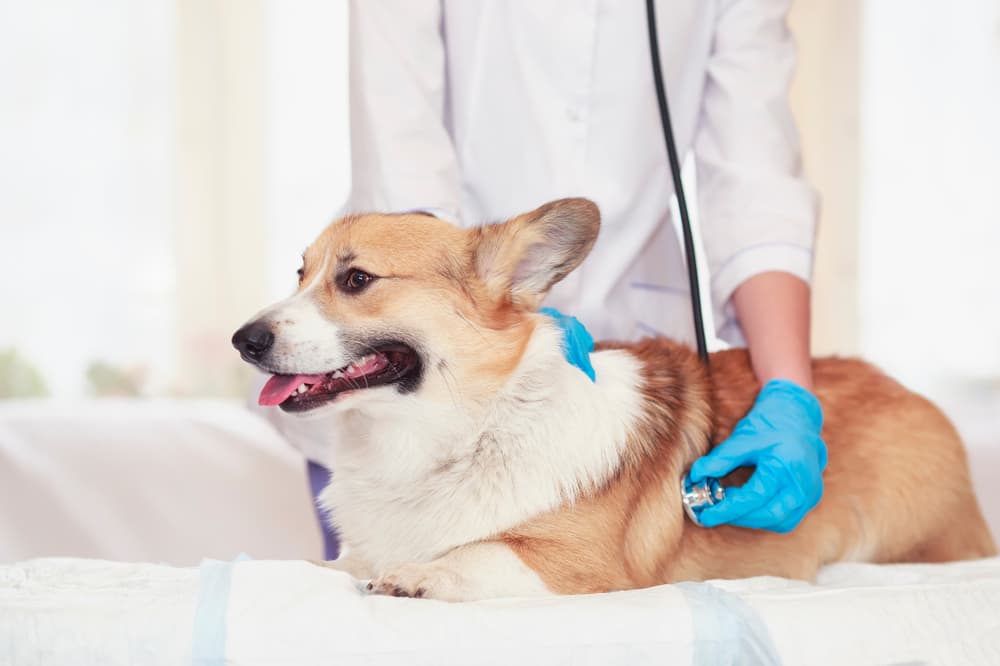My Dog Sounds Congested: 9 Reasons It Might Be Happening

All featured products are chosen at the discretion of the GreatPetCare editorial team and do not reflect a direct endorsement by the author or reviewer.
In people congestion is a fact of life. But what about dogs? Do you ever hear what you think is a cough, sneeze, or snore coming from your pup and think, my dog sounds congested?
Don’t worry, you’re not alone. In this article we’ll go through everything you need to know about congestion in dogs. What does it sound like? What causes it? What you can do to treat and prevent it? Keep reading to learn the answers.
Do Dogs Get Congested?
Yes, dogs get congested. They share many of the same symptoms we experience, such as sneezing and coughing.
Congestion in dogs occurs for many reasons, such as upper respiratory infections or allergies. It isn’t life-threatening, but you may feel concern if your dog starts showing the symptoms.
Viral and bacterial respiratory infections in dogs are highly contagious. It doesn’t take much for dogs in close contact with each other to get sick and start sounding congested.
Some dogs are naturally prone to congestion. Brachycephalic dogs, like Bulldogs, can sound congested because of their smoosh-faced facial structure. They have short snouts, making breathing more difficult. Congestion in these breeds is normal, but may need medical treatment if it’s causing breathing challenges.
What Dog Congestion Sounds Like
If your dog is congested, you’ll hear it. Dogs who experience congestion often cough, and that cough can be distinctive. For example, dogs with kennel cough have a dry, “goose honk” cough.
Coughing due to congestion may worsen when a dog is lying down at night. Severe coughing fits can even make a dog gag or retch, which is far from pleasant to hear.
A congested dog can also have noisy, labored, and rapid breathing. This is because they have to work extra hard to get oxygen into their body. They might breathe with their mouth open as their nose is too stuffy for oxygen to pass through the nasal passages. Sneezing and snoring are also common in congested dogs.
Why Is My Dog Congested?

There are several potential reasons why your dog is congested. Many cases of dog congestion come from viral, bacterial, or fungal infections. Others may be due to chronic disease. Here’s a list of what could be causing your dog’s congestion:
Viruses
- Canine influenza virus (dog flu)
- Canine respiratory coronavirus
- Canine adenovirus type 2
- Canine parainfluenza virus
- Canine distemper virus
Bacteria
- Bordetella bronchiseptica (kennel cough)
Fungi
- Aspergillus
Dogs can spread viral and bacterial infections through respiratory droplets on shared items like food bowls and toys. The fungi Aspergillus can get breathed in as a dog roots through the soil with their nose. When these tiny pathogens enter the airways, the immune system fights back, causing congestion.
Beyond these common causes, there are other reasons your dog may be congested.
Seasonal allergies. Dogs with seasonal allergies are allergic to environmental substances, like pollen. Breathing in these allergens triggers an allergic response, causing congestion.
Congestive heart failure. An end-stage heart disease, congestive heart failure is when the heart can no longer pump blood effectively. It causes fluid to accumulate and leak out of the blood vessels. A fluid buildup in the lungs can lead to symptoms of congestion, like coughing and difficulty breathing.
Heartworms. Heartworms get lodged in the pulmonary (lung) arteries and damage the lungs. Dogs with heartworms often cough and have difficulty breathing.
Foreign object. If something is stuck in your dog’s nose, their immune system will work hard to get it out, causing dog nasal congestion symptoms such as sneezing and a runny nose.
Respiratory tumors. A tumor in the respiratory tract can block the normal flow of air, leading to congestion.
Obesity. Excess weight makes the heart and lungs work extra hard. More pressure on the lungs can lead to a dog having difficulty breathing and sounding congested.
Diagnosing the Cause of Dog Congestion
Call your veterinarian if your dog sounds congested. Not all cases of congestion warrant a trip to the doctor, but do not assume that home remedies are all your dog needs.
Your veterinarian will advise you on bringing your dog in for an appointment. If your dog sounds congested when breathing, is lethargic, or isn’t eating or drinking well, see your vet.
During the appointment, your veterinarian will perform a physical exam, paying close attention to your dog’s lungs, heart, and nose.
Diagnostic tests will help your veterinarian figure out why your dog is congested. Blood work will give clues about your dog’s general health; chest x-rays will help them see abnormalities in your dog’s lungs or heart.
To look in your dog’s nose, your vet may order a rhinoscopy. That’s helpful if they suspect a foreign body or tumor in the nose.
Treating Congestion in Dogs

Treating congestion in dogs depends on the underlying cause. Your vet may recommend these treatments following a proper diagnosis:
- Infection – If an infection is causing your dog’s congestion, the vet will tailor treatment based on the type and severity. For example, you usually won’t get an antiviral medication for viral respiratory infections like the flu or kennel cough. Instead, your vet may recommend at-home care until the illness runs its course (usually 5 to 10 days). If there’s a high risk of secondary infection, like in puppies or immune-compromised dogs, the vet may prescribe doxycycline.
- Allergies – If your dog’s congestion stems from an allergic reaction to inhaled allergens like ragweed, pollen, or dust, your veterinarian may prescribe an antihistamine. These might include Vetadryl Flavored Tablets or generic options, like cetirizine or diphenhydramine.
- Congestive Heart Failure – For dogs with congestive heartfailure, veterinarians often prescribe a diuretic, such as Salix tablets (or the generic form, furosemide).
- Heartworms – If your dog tests positive for heartworm disease, your vet will prescribe a treatment plan based on its severity. And to help your dog breathe easier during treatment, your vet may prescribe a steroid like prednisone, which can lower the inflammation in the lungs and blood vessels.
- Obesity – Some dogs are predisposed to develop obesity, which can cause congestion, especially in brachycephalic breeds. If your veterinarian determines that excess weight is causing congested breathing, they may prescribe a weight management diet. Some options include Hill’s Prescription Diet Metabolic Weight Management or Purina Pro Plan Veterinary Diets OM Overweight Management dog food.
Talk to your vet first before giving your dog any over-the-counter (OTC) medicines to relieve their congestion. These medicines may contain ingredients that are safe for people but toxic to dogs.
Benadryl is a common OTC medicine for relieving allergy-related congestion in humans, but should only be given to dogs with veterinary supervision and guidance.
Home Remedies for Dog Congestion
For mild congestion, at-home supportive care includes rest, hydration, and good nutrition. Adding moisture to the air can make breathing easier. Consider using a humidifier or inviting your dog into the bathroom while you shower.
Wipe your pup’s nose and eyes with a warm, damp cloth to remove nasal discharge as you see it, too.
How to Prevent Dog Congestion
Because there are so many potential causes of congestion in dogs, preventing it is not entirely practical. Vaccines are the best form of prevention against viral and bacterial respiratory infections. Limiting your dog’s time in crowded dog facilities like doggie daycares can also help decrease your dog’s risk of getting congested from these infections.
People commonly take supplements that claim to boost immune health, but these are not recommended for dogs. Currently, there’s no scientific evidence that immune-boosting supplements are beneficial for dogs.









